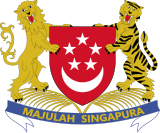
Back Eleccions generals de Singapur de 2011 Catalan Parlamentswahlen in Singapur 2011 German Elecciones generales de Singapur de 2011 Spanish Élections législatives singapouriennes de 2011 French Pemilihan umum Singapura 2011 ID 2011年シンガポール総選挙 Japanese Pilihan raya umum Singapura 2011 Malay Парламентские выборы в Сингапуре (2011) Russian Сінгапурські загальні вибори (2011) Ukrainian Singapur parlament saylovi (2011) Uzbek
| |||||||||||||||||||||||||||||||||||||
All 87 directly elected seats in Parliament (and up to 9 NCMPs) | |||||||||||||||||||||||||||||||||||||
|---|---|---|---|---|---|---|---|---|---|---|---|---|---|---|---|---|---|---|---|---|---|---|---|---|---|---|---|---|---|---|---|---|---|---|---|---|---|
| Registered | 2,350,873[a] | ||||||||||||||||||||||||||||||||||||
| Turnout | 93.18% ( | ||||||||||||||||||||||||||||||||||||
| |||||||||||||||||||||||||||||||||||||
 Results by constituency | |||||||||||||||||||||||||||||||||||||
| |||||||||||||||||||||||||||||||||||||
| This article is part of a series on |
 |
|---|
|
|
General elections were held in Singapore on 7 May 2011. President S. R. Nathan dissolved parliament on 19 April 2011 on the advice of Prime Minister Lee Hsien Loong.[1] Voting is mandatory in Singapore and is based on the first-past-the-post system. Elections are conducted by the Elections Department, which is under the jurisdiction of the Prime Minister's Office. Nomination day was held on 27 April 2011, and for the second election in a row, the PAP did not return to government on nomination day, but it did return to government on polling day.[2] This election also marked the first and the only three-cornered fight since 2001 in Punggol East SMC before it increased to four-cornered fight on a by-election held two years later.
The elections were described as a "watershed" by various parties. The ruling PAP reminded voters that the election will determine "Singapore's next generation of leaders".[3] The Workers' Party called it a "watershed election" both for Singapore and the opposition, as it marked the first time in two decades that the only two incumbent opposition MPs moved out of their respective strongholds and contested in Group Representation Constituencies (GRCs), risking a situation where there would be "no elected opposition MPs".[4] This was despite the elections having the highest proportion of contested seats since independence, with 82 of 87 seats contested.[5] 2011 was the year that saw the highest proportion of seats contested since post-independence; with the second being in 1972 when 57 of 65 seats were contested,[6] It marked the first electoral contests in Bishan–Toa Payoh (since 1991) and Holland–Bukit Timah, and also marked Tanjong Pagar as the only constituency to remain uncontested since its formation in 1991. This was the last general election to date where there were walkovers in at least one constituency as subsequent elections would saw all constituencies being contested for the first time in post-independence since 1963.
The final results saw a 6 percentage point swing against the PAP from the 2006 elections to 60%, its lowest since independence.[7] While the PAP met most expectations to sweep into power and claimed over two-thirds of parliamentary seats, winning 81 out of 87 seats, the Worker's Party (WP) retained Hougang SMC and won Aljunied GRC. This marked the first time a GRC was won by an opposition party since the introduction of GRCs. WP won six seats in Parliament, the best opposition parliamentary result since independence.[8][9] As six Members of Parliament from the opposition were elected, only three Non-Constituency Member of Parliament seats were offered, one to Lina Chiam from the Singapore People's Party and the other 2 seats to Yee Jenn Jong and Gerald Giam from the Worker's Party. These offers were all accepted, resulting in a total of nine opposition MPs after the election.[10][11]
This election marked several firsts: the total electorate exceeded 2 million, and with 94% of the seats contested, this was the "most active" election in Singapore's history between 1968 and 2011. As the presidential election occurred three months after the election, 2011 also marked its first year in Singapore since the amendment of the constitution of elected presidency in 1991 where both national elections were held in the same calendar year.
Cite error: There are <ref group=lower-alpha> tags or {{efn}} templates on this page, but the references will not show without a {{reflist|group=lower-alpha}} template or {{notelist}} template (see the help page).
- ^ "Constitution of the Republic of Singapore". Attorney-General's Chambers of Singapore website. Archived from the original on 15 February 2017. Retrieved 17 December 2008.
- ^ Chong, Terence (21 November 2018). "A Return to Normal Politics: Singapore General Elections 2011". In Singh, Daljit; Cook, Malcolm (eds.). Turning Points and Transitions: Selections from Southeast Asian Affairs 1974–2018. Kent Ridge, Telok Blangah, Singapore: ISEAS Publishing. pp. 622–23. doi:10.1355/9789814843089-050. ISBN 9789814843089.
However, the fact that the ruling PAP was not returned to government on Nomination Day is not new … GE2006 and GE2011 mark a return too the old.
- ^ Good to have strong contest: PM Lee. Straitstimes.com (28 April 2011). Retrieved 4 May 2011.
- ^ Stakes and risk very high for opposition: WP chief. Straitstimes.com (28 April 2011). Retrieved 4 May 2011.
- ^ GE 82 of 87 seats contested Archived 29 April 2011 at the Wayback Machine. Channel NewsAsia (27 April 2011). Retrieved 4 May 2011.
- ^ Singapore Parliamentary General Election 1972 Archived 2 May 2011 at the Wayback Machine. Singapore-elections.com. Retrieved 4 May 2011.
- ^ Brown, Kevin (8 May 2011). "Singapore opposition makes historic gains". Financial Times. Retrieved 9 May 2011.
- ^ "81 out of 87 seats for PAP". Straits Times. 8 May 2011. Archived from the original on 9 May 2011. Retrieved 8 May 2011.
- ^ Cite error: The named reference
nytwas invoked but never defined (see the help page). - ^ Kor, Kian Beng (13 May 2011). "SPP accepts NCMP offer for Mrs Chiam". Straits Times. Retrieved 13 May 2011.
- ^ Hussain, Zakir (13 May 2011). "WP's Yee Jenn Jong, Gerald Giam, to take up NCMP seats". Straits Times. Archived from the original on 16 May 2011. Retrieved 13 May 2011.
© MMXXIII Rich X Search. We shall prevail. All rights reserved. Rich X Search


